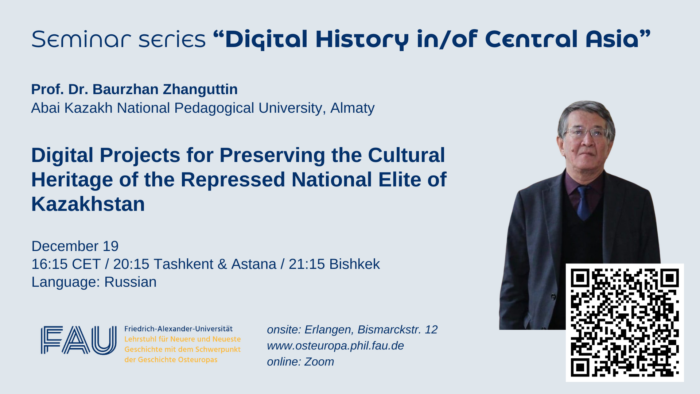Seminar series „Digital History in/of Central Asia“
Seminar series “Digital History in/of Central Asia”
 as part of the seminar of the Chair of Modern and Eastern European History, Friedrich Alexander University Erlangen-Nuremberg in collaboration with the German Association for East European Studies (Deutsche Gesellschaft für Osteuropakunde, DGO)
as part of the seminar of the Chair of Modern and Eastern European History, Friedrich Alexander University Erlangen-Nuremberg in collaboration with the German Association for East European Studies (Deutsche Gesellschaft für Osteuropakunde, DGO)
Overview
This ongoing seminar series will explore the history of Central Asia, with a focus on digital tools and methodologies. Central Asia is a diverse region encompassing Kazakhstan, Kyrgyzstan, Tajikistan, Turkmenistan, and Uzbekistan. This seminar will cover such topics as mapping ancient trade routes, digitising manuscript collections, computational text and image analysis, translations and corpuses of historical texts, 3D modelling of architectural sites, development of digital repositories. Special emphasis will be placed on 19th-21st century history, encompassing themes of colonial legacies, repressions and deportations in the Soviet Union, cultural history, and memory studies within the Central Asian context.
The speakers of the seminar will be leading researchers and experts from Central Asian countries involved in digital history and the preservation and study of historical cultural heritage, as well as researchers from around the world engaged in research and collections on the history and culture of the region using digital instruments.
The seminar is designed to foster the creation of networks and collaborations among Central Asia experts, facilitating the exchange of ideas, innovative methodologies, and knowledge within the realm of digital history. Our goal is to engage in discussions surrounding joint initiatives and to enhance our collective capacity for growth and development in this field.
Organizers
Organizers:
- the Chair of Modern and Eastern European History, Friedrich Alexander University Erlangen-Nuremberg;
- the German Association for East European Studies (Deutsche Gesellschaft für Osteuropakunde, DGO).
The idea of the seminar was proposed by Prof. Dr. Julia Obertreis, the chair of the department in 2012-2023, who passed away in October 2023. Professor Obertreis conducted extensive research on the history of cotton cultivation and irrigation infrastructure in Central Asia during the imperial and Soviet eras. Her book „Imperial Desert Dreams“ examined water management in Uzbekistan and Turkmenistan from 1860-1991, linking it to colonialism and transnational debates. Her scholarship provided crucial insights into the environmental and social legacies of Soviet modernization in the region.
The seminar is held in memory of Prof. Julia Obertreis.
Seminar curators: Moritz Florin (moritz.florin@fau.de) and Dinara Gagarina (dinara.gagarina@fau.de). These contacts can be used to suggest topics for the seminar.
Format
The seminar will meet one or two times every month, with each session featuring a guest speaker presenting original research followed by Q&A and discussion. Sessions will be held in a hybrid format, with both in-person and virtual attendance options to facilitate broad participation. Working languages of the seminar: English, German, Russian.
The seminar is held in a hybrid format:
- online: Zoom;
- onsite: Bismarckstraße 12, 91054 Erlangen.
Next seminar
The sixth seminar will be held on December 19, 2024, 16:15 CET (/ 20:15 Tashkent and Almaty / 21:15 Bishkek) online in Zoom and onsite: Erlangen, Bismarckstr. 12.
Topic: Digital Projects for Preserving the Cultural Heritage of the Repressed National Elite of Kazakhstan.
Invited expert: Prof. Dr. Baurzhan Zhanguttin, Abai Kazakh National Pedagogical University, Almaty, Kazakhstan.
The presentation language: Russian, questions can be asked in Russian, Ukrainian, English, German.
Registration and Zoom-link: https://fau.zoom.us/meeting/register/u5Mtf-yrqD0vHNCBnCl-7cYLWLU1aV-CEu9s#/registration

Previous seminars
- November 9, 2023, Prof. Dr. Zamira Ishankhodzhaeva, professor of the Department of History of Uzbekistan, National University of Uzbekistan named after Mirzo Ulugbek, Tashkent: Repressive policy of the Soviet authorities in the field of culture (1925-1953).
- January 11, 2024, Gulzat Alagoz, researcher at the Esimde research and discussion platform, Bishkek, Kyrgyzstan: Esimde Research and Discussion Platform: Why is Citizen Science Important?
- February 1, 2024, Dr. Taissiya Marmontova, associate professor, School of Social-Humanitarian Studies, Astana International University, Kazakhstan: Politics of Memory in Historical Retrospect: Case of Kazakhstan.
- February 22, 2024, Prof. Dr. Kairat Alimgazinov, head of the Center for Scientific and Applied Projects, Archive of the President of the Republic of Kazakhstan, Almaty: „History of Kazakhstan“ Portal and Archive Digitization Initiatives in the region.
- April 4, 2024: Iuliia Iashchenko, visiting researcher at the Chair of Modern and Eastern European History FAU; Ph.D. candidate in European History at La Sapienza University of Rome: The Cost of Life: Female Experience of Ethnic Cleansings under Stalinism in Central Asia.
- June 13, 2024: Dr. Serhii Kokin, senior researcher at the Institute of History of Ukraine of the National Academy of Sciences of Ukraine: Declassification of Archival Documents and Providing Access to Them: The Experience of Ukraine (1991–2024).
Announcements of future seminars will be published on this page.
